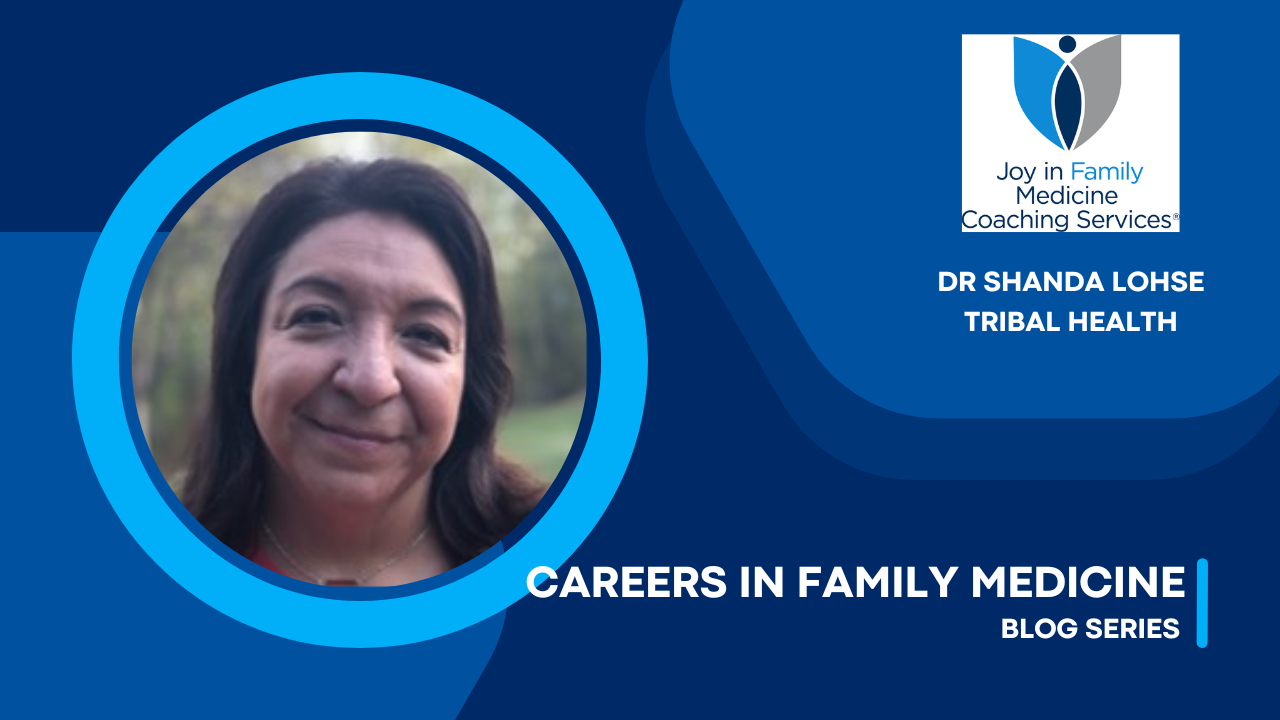
Careers in Family Medicine: Tribal Health
We’re continuing our Careers in Family Medicine series highlighting physicians whose work reflects the breadth and meaning of this specialty. This week, we turn to Tribal Health, a setting that combines rural medicine, cultural connection, and the unique challenges of caring for communities across Alaska’s most remote regions.
Dr. Shanda Lohse, a family physician and Medical Director with Eastern Aleutian Tribes, shares how her heritage, leadership, and dedication to service have shaped 18 years of work in Tribal Health organizations.
Enjoy the conversation below.
Shanda, give the readers an overview of your career in family medicine.
I have been a Family Medicine physician for 18 years, all of which has been in the great state of Alaska. I went to Columbia University in New York City for undergrad, then to the University of Minnesota School of Medicine in Minneapolis. I did my Family Medicine residency at Hennepin County Medical Center in Minneapolis. I came to Alaska in 2005 right after residency to work at Southcentral Foundation in Anchorage. This is a large Tribal Health Organization. I worked at the Anchorage Native Primary Care Center for 6 years, then moved to the Valley Native Primary Care Center in Wasilla for 7 years. I was a Medical Director for most of my time at Southcentral Foundation. I then took a position with a smaller Tribal Health Organization here in Alaska--Eastern Aleutian Tribes. I quickly became the Medical Director and have now been at Eastern Aleutian Tribes for 5 years.
I am Native American, a proud member of the Standing Rock Lakota Tribe, and grew up on and right off the reservation in South Dakota. It was always my goal to work with Native communities, and I am pleased that my career has always been with Tribal Health Organizations in Alaska. I believe that people are more likely to trust someone with a similar background to them.
What are your favorite things about your current role?
My favorite thing about my current position is helping to provide excellent care to the people in the region that Eastern Aleutian Tribes serve. The Aleutian chain is isolated and can only be reached by aircraft or boat. The closest hospital is 600-1000 miles away, depending on which community you are in. Weather is always a factor in the region year-round. Providing top-notch care in the region helps to avoid needing to travel to Anchorage for specialty care or emergency care.
What have been the challenges?
The travel mentioned in the last question is the biggest challenge. We might have someone lined up for specialty care in Anchorage with flights and housing booked, but weather will happen and the flight gets cancelled. We then have to start the process all over with rescheduling the appointment and travel. This is frustrating for the patient and can delay care significantly.
What specific approaches do you take to enhance your personal and professional fulfillment and joy?
I try to take time for myself once I leave work.
I spend time with my family and pets, as well as my friends.
I make time to exercise and try to get massages regularly.
Taking time for yourself is essential for both personal and professional fulfillment.
Any tips for those looking at their first job (or those who are looking to pivot) on how to decide?
The Medical Director position I have now has much less direct patient care than my previous positions. I thought this was going to be hard for me, but I have realized that medical systems need people with experience and compassion in leadership positions to keep the system working well. My tip is to not be afraid of a position if it is not exactly what you think you should be doing. I have come to love my current position.
Any tips or perspectives you'd like to share with readers wondering about a career in tribal health or other similar systems?
Tribal Health needs you! We are always looking for people who have a passion to work with underserved communities in a rural or frontier setting, and who are comfortable seeing anything. This is what makes Family Medicine a perfect fit for Tribal Health.
Any other things you’d like to share?
I think it is important to have a mentor while going through medical school, residency, and early career. If you are struggling with something, your mentor has likely gone through the same struggle or knows someone who has. There were many times throughout my journey I had to deal with something and having a mentor to talk through things was invaluable.
Great! Thank you for taking the time to share your wisdom with the readers.
Dr. Shanda Lohse’s journey is a powerful example of commitment—not just to medicine, but to the communities and cultures she serves. Her reflections on leadership, mentorship, and flexibility in career choices are worth carrying forward no matter where you practice.
What part of Shanda’s story resonated most with you?
Next week: we'll dive into a Concierge Practice set within a University with Dr Amruti Borad.
Until then, have a joy-filled week! Tonya
Join Weekend Reads
Weekly insights, tips, and tools for physicians who want to thrive—plus a dash of fun.
We hate SPAM. We will never sell your information, for any reason.

